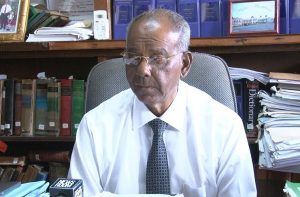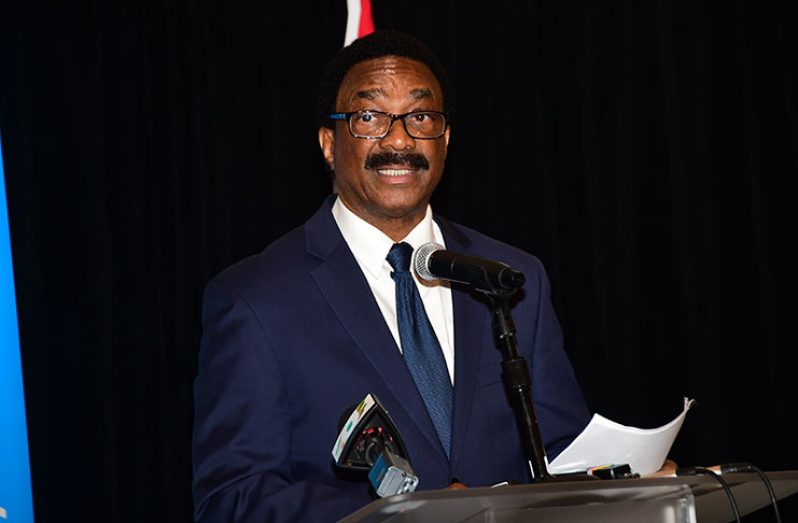…Oral arguments close in challenge to non-residents voting in Guyana
…Ramkarran wants court to freeze case until after elections
…AG says no evidence provided that residency is not a requirement for electors
By Svetlana Marshall
TWO days after pleading with the Appeal Court to decline jurisdiction in a case challenging the High Court’s decision to block the removal of persons from the National Register of Registrant (NRR) Database, Senior Counsel Ralph Ramkarran, on Wednesday, asked the court to freeze the case until after the March 2 General and Regional Elections.
Wednesday marked the end of oral arguments in the partial appeal brought by the Attorney General and Minister of Legal Affairs, Basil Williams, against Chartered Accountant, Christopher Ram; the Guyana Elections Commission (GECOM); and the Chief Elections Officer (CEO), Keith Lowenfield.
Before Ramkarran backpedalled on his earlier position, the Attorney General told the panel of three judges, led by Chancellor of the Judiciary, Yonette Cummings-Edwards, that, from the onset, Ram and his attorney (Ramkarran) provided no rebuttal evidence as it related to the Constitutional Amendment Act of 1991.
On Monday, the Attorney General had argued that, with the abolition of overseas voting in 1991, the residency requirement for voting was restored in the Constitution with the exception for diplomats, their families and staff – a position he maintained on Wednesday.
“We respectfully contend that there is a clear and unambiguous concession on the part of Mr. Ramkarran, Senior Counsel, that, for the purposes of registration as an elector, residency is a requirement under the National Registration Act and his submission comports with the position of that outlined by the Report of the Constitutional Reform Commission for which he was the Chairperson,” Minister Williams told the Appellate Court.

Putting the case into context in light of Ramkarran’s initial submission that the Court should decline jurisdiction on the basis that it was an ‘elections matter,’ the Attorney General explained that it was Ram, who, in a Fixed Date Application (FDA) on July 22, 2019, challenged the House-to-House Registration process. That matter concluded on August 14, 2019 with the High Court refusing all the orders but the inclusion of an order “that the removal of the names of persons on the list of registrants and who were not, or have not been, or are not registered in the current house-to-house registration exercise would be unconstitutional.”
The Attorney General, in rejecting the contention that it was an elections matter, alluded to the fact that the Notice of Appeal was filed in September, 2019, approximately three months before President David Granger issued an Election Proclamation.
“This matter is not an elections matter in any shape or form, but it is strictly speaking a constitutional issue as to whether Residency is a fundamental prerequisite for voting in Guyana,” he told the appellate judges while referencing to the case of Zulfikar Mustapha v. The Attorney General Civil Appeal (2018), in which, the Appellate Court rejected a similar argument that was advanced in that case. The Appellate Court’s position in that matter was endorsed by the Caribbean Court of Justice (CCJ).
“The argument of election matters ought to be rejected because this is a constitutional issue that goes to the heart of our democratic system which is the requirement for Residency for purposes of qualification to be an elector,” Minister Williams maintained. He said the court must continue to be the guardian of the Constitution, and no one should disobey it with any level of impunity.
Minister Williams, in his rebuttal, also rejected the notion, that should the Appellate Court rule on the matter there could be far reaching consequences. “We respectfully contend that the only far-reaching consequence for the purposes of this appeal is that the legislature has prescribed Residency by a constitutional amendment and any disregard to it would have far-reaching consequences for our democratic system of justice because GECOM the constitutional body would be confronted with a logistical nightmare of persons voting who were not properly qualified to be electors,” he argued. He iterated that the court cannot abdicate its responsibility on having the final say in what the Constitution says or what parliament intended.
Ramkarran, in his rebuttal, turned the court’s attention to Article 163 (1)(b)(i) of the Constitution. It states that “(1) Subject to the provisions of this article, the High Court shall have exclusive jurisdiction to determine any qualification – (b) whether (i) either generally or in any particular place, an election has been lawfully conducted or the result thereof has been, or may have been, affected by any unlawful act or omission.”
For him, the operative words are “unlawful act or omission.” He said the case currently before the Appellate Court is similar to that of the Esther Pereira case and should have been brought by way of an Elections Petition. “In this case, the argument is that the retention of names of non-residents on the electoral roll is a violation of the Constitution, same principle basically. One is a law passed by the National Assembly was a violation of the Constitution; that was an elections petition, and in this case, the argument is, the retention of names of non-residents on electoral roll is a violation of the Constitution,” Ramkarran reasoned.
He argued that the case became an ‘elections matter’ with the issue of the proclamation by President Granger. “Once the elections train leaves the station, every issue, has to be determined by way of an elections petition,” Ramkarran told the appellate judges.
Interjecting, the Chancellor, queried whether matters are deemed elections in nature before or after a proclamation has been issued. Though not offering a direct response, Ramkarran admitted that the case was filed and ruled upon long before the proclamation was issued.
“Your honours, if you proceed and give a decision in this matter, your honours will be giving a decision in an elections issue which ought properly to have been litigated by an elections petition after the elections,” he stated.
But when further pressed by the Chancellor for more answers, Ramkarran backpedalled on his earlier position, which was, that the court should decline to rule on the matter, and instead offered what he considered to be “an innovative argument.”
“Would your honor consider putting the matter down until the elections are over and treating the case as an elections petition…Postpone the decision instead of declining jurisdiction, postpone the decision until after elections, and then treat the matter as an elections petition,” he asked the Court. But Ramkarran was reminded that the Appellate Court would require leave, even if his suggestion was applicable.
The Attorney General, in responding to Ramkarran, maintained that the Appellate Court has jurisdiction to rule on the matter. GECOM’s Attorney, Senior Counsel Stanley Marcus; and President of the Guyana Bar Association, Teni Housty, who appeared Amicus Curiae, also made closing arguments on Wednesday. The appellate Justices – Chancellor Yonette Cummings-Edwards; Justice Dawn Gregory and Justice Rishi Persaud, indicated that they will consider all arguments and will send notices shortly.



.jpg)









